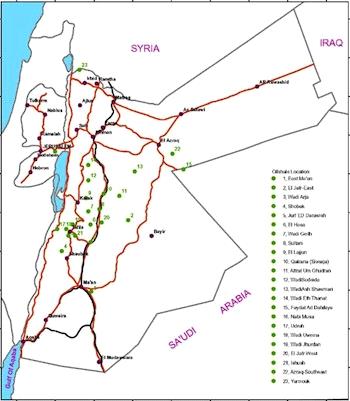Ammon News - Harnessing new technology to extract Jordan's oil shale reserves could help reduce reliance on imported hydrocarbons as well as enhance energy security.
Jordan imports up to 97% of its energy needs, including fuel to fire its power stations. Disruptions to gas supplies from Egypt, which have left the Kingdom scrambling to find alternatives, coupled with rising prices, drove up energy import costs last year to an estimated $5bn, equivalent to around 15% of GDP. This figure is expected to increase in the future, with demand for electricity growing by 7% each year.
The rising cost of energy has also put pressure on the fiscal balance. In late 2012 the government lifted certain fuel subsidies in an attempt to reduce state spending, replacing them with cash transfers to low- and middle-income Jordanians.
While this solution was a politically unpopular move, it met with approval from the IMF, which has pointed out that high energy costs represent the country's greatest challenge to growth. Speaking in March following meetings held to review the progress of last year's standby arrangement with the Kingdom, the fund's deputy chief, Nemat Shafik, described energy as the "Achilles heel" of the Jordanian economy. "It's a huge vulnerability for Jordan...the biggest drain on the economy," she said.
Dependency on imported energy could be reduced, at least in part, as Jordan moves closer to launching its first power plant to be fired by locally mined shale oil.
Jordan is estimated to have up to 70bn tonnes of commercially viable shale oil for extraction and could provide up to 100bn barrels of oil equivalent. The government plans to use shale oil to fire a 460-MW power station that will be built at Attarat um Ghudran, south of Amman.
On April 17, Attarat Power Company (APCO), the Jordanian-Estonian joint venture developing the power station, announced it had received bids from six international firms to build the plant. The offers were made by the French/South Korean consortium Alstom/Daewoo E&C, South Korea's Hyundai E&C/LG International, Samsung Engineering of South Korea, the China Machinery Engineering Corporation, Posco/Daewoo International of South Korea and China's Guangdong Power.
"The bids received today mark another important step in our steady progress towards establishing a source of power generation for Jordan that will be wholly reliant on the Kingdom's own abundant deposits of oil shale," Andres Anijalg, APCO's project director, said. He added that the process of selecting the successful bid would be planned around the timeline for constructing the plant, which is scheduled to begin next year.
APCO hopes the project will be operational in the last quarter of 2017, although Anijalg acknowledged that state backing would be required for this target to be met. "For us to meet that objective and for Jordan to start benefitting from its oil shale resources as soon as possible, we will now need strong support and commitment from the Jordanian authorities," he said.
The tender announcement marks a key stage in the Attarat power station project. Five years have passed since the Estonian firm Enefit signed an agreement with the Jordanian government to develop the facility and an oil processing plant. Observers have suggested that backing from Amman and a fast-tracking of state approvals will be required to ensure the project's tight deadline is met.
Jordan expects to develop at least one more shale oil-fired power station to run alongside the Attarat um Ghudran facility. A number of plants needed for processing the shale to extract the oil are also set to be rolled out.
The initiatives will support the Kingdom's bid to have electricity from shale oil-fired stations meet 14% of demand for power by the end of the decade. The figure should rise as more resources are developed and additional facilities built to utilise them, with the Attarat um Ghudran power station alone expected to cut Jordan's annual energy import bill by around $500m.
However, it will take at least four years for the station's benefits to be felt and power shortages will continue to present a challenge in the shorter term.
"We face definitely a tough situation regarding energy. It will remain an alarming issue for the coming three or four years, until some of the projects such as oil shale kick in," former energy minister Alaa Batayneh told Reuters news agency in early April. While investors will be mindful of the energy problems Jordan faces today, the prospect of shale oil-generated power in the future suggests a more positive outlook for the medium term. (Oxford Business Group)
